MADRID, 30 Abr. (EUROPA PRESS) –
Pancreas cancer is one of the most lethal forms of cancer, characterized by its late detection, rapid progression and high resistance to conventional treatments. Due to the deep location of the pancreas and the lack of specific early symptoms, most cases are diagnosed in advanced stages, when therapeutic options are limited.
Introduction: Lethal and urgent cancer
Las Survival rates They are still low: less than 10% of patients survive five years after diagnosis, which underlines the urgency of finding more effective therapies. In response to this challenge, new therapeutic approaches are being developed, such as the use of inhibitors aimed at specific genetic mutations that drive tumor growth.
The new Laboratory of the Honorhealth Research Institute in the center of Phoenix (United States) has presented a first study, focused on a new promising treatmentDaraxonraib, for pancreas cancer, one of the most aggressive and difficult malignant neoplasms.
A new promising treatment: Daraxonrasib
The results of the study are presented in Chicago at the annual meeting of the American Association for Cancer Research (AACR), the largest professional organization in the world of cancer researchers, caregivers and defenders of patients, with 58,000 members.
-The study results indicate that a newly discovered drug, the RMC-6236, also known as Daraxonrasib, is a powerful RAS inhibitor (including Kras, Nras and HRAS). These genes, commonly mutated, cause cancer and promote the formation of many types of tumors, including pancreatic cancer. This study evaluated the effectiveness of RMC-6236 in pancreatic tumors derived from patients with KRAS mutations.
According to this initial study, conducted by the new laboratory of the Translation Sciences Center of the Research Institute, the RMC-6236, when combined with other proven efficacy drugs against pancreas cancer, constitutes a new promising agent against RAS, particularly KRASG12X. Current KRASG12C inhibitors cannot act on other mutations and often have the unwanted effect to generate drug resistance in patient tumors.
Results in preclinical models and perspectives
“The fibrotic tumor microenvironment in pancreatic cancer exacerbates resistance to therapy, and the combination of RMC-6236 with other therapies could overcome intrinsic and acquired resistances,” according to Taylor Bargenquast, clinical research technique and main author of the study summary.
“These results demonstrate the effectiveness of the RMC-6236 when combined with other therapeutic agents in a pancreatic cancer model: a three-dimensional model of pancreatic cancer cells derived from patient biopsies,” adds Sunil Sharma, director of the Translational Sciences Center and main author of the study summary.
“The combination of RMC-6236 with standard chemotherapy and directed therapies improves its antitumor activity, which suggests a promising strategy to improve the therapeutic results in pancreas cancer,” says Erkut Borazanci, another of the authors of the study and medical director of the Institute’s oncological research division.
The Translational Genomic Research Institute (TGEN) based in Phoenix, part of City of Hope, contributed to this study (which evaluates the effectiveness of the RAS (ON) inhibitor RMC-6236 combined with chemotherapy and other therapies directed in 3D models involving patients with pancreatic cancer with KRAS mutation). The study suggests that clinical trials are justified in humans to more evaluate the safety and efficacy of RMC-6236.






